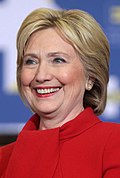| |||||||||||||||||||
| |||||||||||||||||||
 Election results by county.
| |||||||||||||||||||
| Elections in Nebraska |
|---|
 |
The 2016 Nebraska Democratic presidential caucuses took place on March 5 in the U.S. state of Nebraska as one of the Democratic Party's primaries ahead of the 2016 presidential election.
Contents
On the same day, Democratic primaries were held in Kansas and in Louisiana, while the Republican Party held primaries in four states. The Republican Party and Libertarian Party Nebraska primaries were held on May 10.

